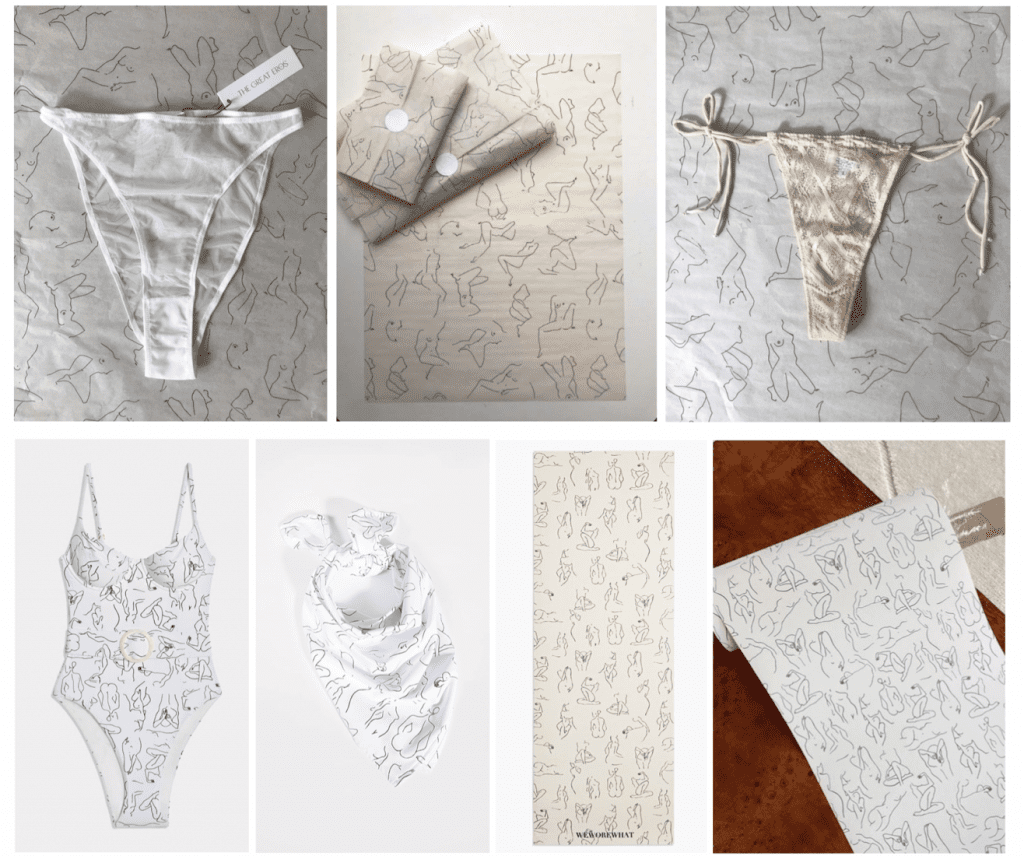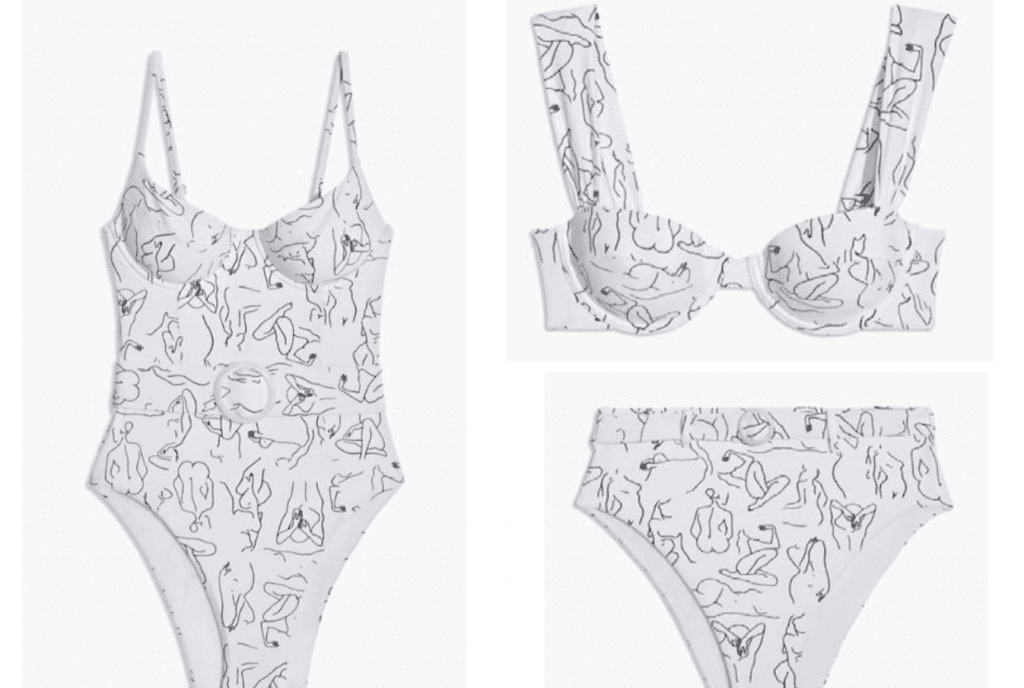The battle between a big-name influencer and a Brooklyn, New York-based brand is heating up. In response to the declaratory judgment suit that influencer Danielle Bernstein’s company WeWoreWhat filed against it in October over an alleged copycat print, CV Collection, LLC, d/b/a The Great Eros (“Great Eros”) has filed a suit of its own. In the lawsuit that it lodged in a California federal court on Tuesday, Great Eros claims that WeWoreWhat (“WWW”) is on the hook for copyright infringement and unfair competition as a result of its hijacking of the “signature print” that appears on the tissue paper that Great Eros says it has used since its inception.
According to the November 10 complaint, which names WWW, Danielle Bernstein, and their manufacturing partner Onia LLC, as well as retailers Saks Fifth Avenue, Shop Bop, and Carbon 38, Inc. as defendants, Great Eros claims that since it got its start (in 2016, according to the brand’s website), it has been wrapping its products in tissue paper that is covered with “sensual illustrations of female figures in various states of repose,” i.e., its signature print.
The brand claims that at some point (it does not specify exactly when), Bernstein and WWW – “an upstart ‘fast-fashion’ label” – entered into a joint venture with their manufacturing partner Onia “to produce and distribute swimwear and other products that prominently featured” Great Eros’ signature print. “Their knock-off proved to be so popular,” Great Eros argues, that Bernstein, Onia, and WWW “chose to produce and sell other goods bearing the same infringing design – including scarves, yoga mats, and even wallpaper – which were sold by Defendants Saks, Shop Bop and Carbon.”
Upon learning of the allegedly infringing products, counsel for Great Eros alleges that they contacted WWW, which “arrogantly rebuffed [Great Eros’] demand that they cease use of its work, implausibly claiming they had not copied the work, that the [Great Eros] design reflected no appreciable creativity, and that neither Ms. Bernstein, nor anyone associated with WWW had even heard of Great Eros, let alone purchased any of their goods.” (The defendants also were seemingly unmoved by Great Eros’ Instagram response, which alerted them last month that they “have 24 hours to withdraw your lawsuit against us.”)
In addition to pointing to Bernstein’s “history of copying others’ designs and passing them off as her own,” Great Eros claims that Bernstein had, in fact, “visited the showroom of [Great Eros’] sales representative prior to producing the infringing goods, and inquired about obtaining [Great Eros’] products in exchange for promoting [the company] through her social media channels.” Great Eros asserts that it “believes that Ms. Bernstein, WWW, and/or Onia subsequently purchased products from [Great Eros] that were wrapped in [its] trademark tissue paper … and instructed their pattern makers to copy the [design] for use on the infringing goods.”
As for the print, itself, Great Eros claims that it maintains copyright and trademark rights, which the defendants infringed by allegedly reproducing it. On the copyright front, the brand claims that the print – which was created in 2017 – “is one of graphic art [that] features an arrangement of many individual elements, of a certain narrow range of shapes, subjects, sizes, and orientations,” with the protectable work being “the overall effect and impression of such conformation of elements.”

Great Eros argues that the defendants infringed its registered copyright in the print “by copying and reproducing [it] on the infringing goods.”
In terms of the “trademark infringement” claim that Great Eros sets out at the top of its complaint, it turns out that the claim it actually makes in the body of the complaint is for “unfair competition” under the Lanham Act, in connection with which Great Eros asserts that its “design” is “an indicator of source, [and] is strong, fanciful, non-functional, distinctive, and inherently distinctive.”
In case it is not “inherently distinctive,” Great Eros claims that as a result of its “marketing, promoting, and selling its products, the design has become distinctive of [its] brand and products, and has acquired secondary meaning among relevant consumers and the public generally.” With such “strong” rights in mind, Great Eros claims that WWW’s use of the “design” is likely to “cause confusion or mistake or deception of purchasers as to the source of [WWW’s] goods,” and the defendants’ “conduct will damage [Great Eros’] ability to enjoy, maintain and exploit its hard-won brand-recognition.”
As a result of the foregoing, plus additional claims of Unfair Business Practices Under California Business and Professions Code and Unfair Competition Under California Common Law, Great Eros argues that it is entitled to damages, as well as injunctive relief to bar the defendants from continuing to engage in such allegedly infringing behavior. Great Eros is also seeking an order from the court requiring the defendants “to immediately recall and remove any and all infringing products from the marketplace.”
While nearly all of the parties at issue are primarily based in New York, where WWW filed its own suit last month, Great Eros filed its complaint with the U.S. District Court for the Central District of California, claiming that jurisdiction in California is proper because the defendants “have purposely availed themselves of the privilege of doing business in California and in this District, and because the alleged misconduct” – and the defendants’ “marketing activities” – were “directed to California and this district.” (In short: the WWW products were offered for sale in and the defendants marketed those products in California).
The case comes a month after WWW and co. filed a declaratory judgment against Great Eros, asking a New York federal court to formally declare that despite Great Eros’s allegations to the contrary, a pattern used by WWW “does not infringe or otherwise violate [Great Eros’s] purported copyright or any other rights under the Lanham Act or common law.”
UPDATED (March 18, 2022): In a stipulation for dismissal dated March 14, Great Eros moved to dismiss all of its claims against the defendants with prejudice, with the filing stating that each side will bear its own costs and attorneys’ fees. The filing also states that all of the named defendants in the case have stipulated to the dismissal, presumably on the heels of the parties reaching a confidential settlement agreement out of court. Judge Paul Engelmayer signed off on the stipulation, formally dismissing the case on March 15.
On March 18, WeWoreWhat, LLC and Onia, LLC moved to voluntarily dismiss their suit.
*The case is CV Collection, LLC, v. WEWOREWHAT, LLC, et al, 2:20-cv-10290 (C.D.Cal.).











